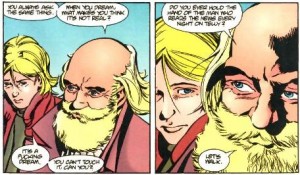I can’t say I don’t care about Before Watchmen, but I don’t care a lot about it. I don’t like Alan Moore and Dave Gibbons’s Watchmen enough to be interested in more work in that setting in and of itself, but the creative teams, with the exception of Joseph Michael Stracynski, seem fairly interesting. I think it’s a bit of a crap move on all parts, considering the history of the book and its creators, but hey, comics is powered by tears and exploitation. I’ll maybe check out the books Brian Azzarello is working on, but more likely… I won’t.
Lucas Siegel, Newsarama’s (chief? senior?) editor wrote an opinion piece about why Before Watchmen is a good idea. Setting aside the obvious hit-whoring aspect of the piece (in this case, chiming in on the hot-button topic of the day requires a fistful of passive-aggressive shots, getting the name of a major work wrong, making a bunch of specious assumptions, and then cheerleading til your throat’s sore instead of overloading on snark and sneering your opinion out at the ignorant plebes who Just Don’t Get It), he said one thing I thought was disgusting coming from a comics fan, and appalling coming from a comics journalist, one of the gatekeepers of the culture:
Some will point to Alan Moore’s lack of “approval” or involvement as a bad thing, but that’s one of the best parts in my eyes. It’s good to see new creators taking on these characters. it’s good to have fresh voices reaching into these characters. If a character is compelling, there should always be more stories to tell. Moore’s assessment that DC is relying on his “ideas from 25 years ago” is ludicrous and insulting to the talented people working on these books. He didn’t write prequels, they’re writing them. It’s like saying all of his use of public domain characters is him relying on other peoples’ ideas from 100 years ago: he can’t have it both ways.
The bolds are mine, though I really probably could have bolded everything, triple underlined, and highlighted the entire thing.
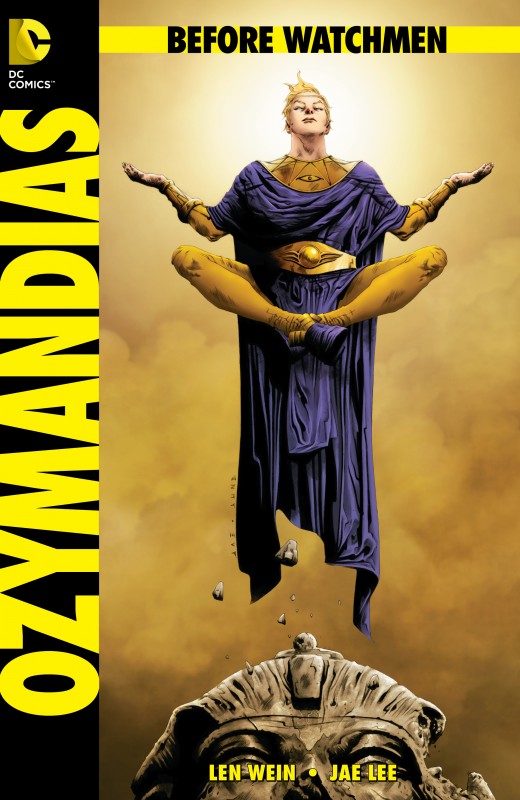
My opinion of late-era Alan Moore (or his public portrayal, you know what I mean regardless) is complicated. I disagree with his idea that nothing in comics is as good as Watchmen or whatever, and I don’t really like how he’s trotted out by the press once or twice a year to drum up hits by saying something about kids on his lawn. At the same time… he’s definitely earned the right to be cranky about the comics industry. He’s been repeatedly screwed by DC Comics in a number of ways, and his relationships with Marvel, Rob Liefeld (I believe?), and a fistful of other people aren’t so much “on the rocks” as “dashed on the rocks and left there while birds pick out its guts.” I get where he’s coming from, and though it took me a while, I get it. I really do.
I don’t think DC planned to screw him over Watchmen, at least not originally. I think that book was a runaway success that surprised everyone and helped birth a new aspect of the market, and all of that went down in such a way that Moore and Dave Gibbons’s ownership of Watchmen were stray bullets. Moore and Gibbons were supposed to gain ownership, or something similar, once the book had been out of print for a year. From what I’ve heard, it was a good contract, totally reasonable… but the book they made was so good that it generated so much demand that taking it out of print would be throwing away dollars. The future came out of nowhere and screwed up the plans.
Once DC Comics realized that, though, I think they should have renegotiated with the creative team to keep it in print, give them some share of the rights, and then get together to take money baths down at the bank. Instead, they went for the short-term gain, and now the trail of destruction that sits between DC and Alan Moore is unforgivable. They had a chance to make good, to not pull all of the tricks the comics industry is known for pulling, and didn’t. Their short-term business sense said that taking the money and running was a good idea. Long-term thinking would’ve told them that giving Moore and Gibbons what they agreed on, and then nurturing that relationship over the next 25 years, would have let them make a ton of money. It’s a complicated situation and I’m (obviously) not an entertainment lawyer, but I genuinely believe that it should have gone down differently. There’s a moral aspect that should not have been ignored.
Some will point to Alan Moore’s lack of “approval” or involvement as a bad thing, but that’s one of the best parts in my eyes. It’s good to see new creators taking on these characters. it’s good to have fresh voices reaching into these characters. If a character is compelling, there should always be more stories to tell.
Alan Moore being unhappy–no, sorry, the lack of Alan Moore’s pass-agg scare quotes approval pass-agg scare quotes is “one of the best parts in my eyes.” Really though? Why? What does that bring to the equation, other than an old man being unhappy and you getting some cape comics down your gullet? What possible joy is there in some man you’ve never met feeling burned by the industry that he made his name in? Is it like veal? Do Moore’s spitty tirades taste sweet, thanks to all the suffering?
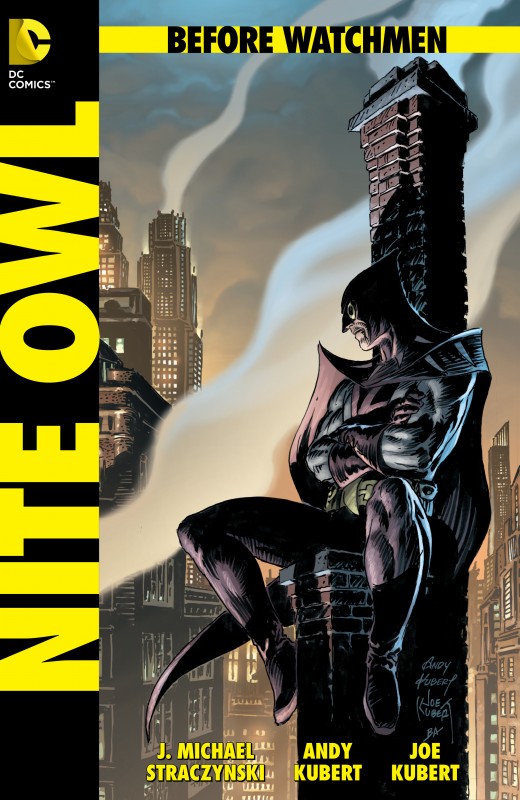
Lucas says that it’s good to see new creators taking on these characters. He has half a point. I’m sure the creative teams (save for Joseph Michael Straczynski) will come up with interesting and worthwhile stories. But Lucas pitches it as Moore standing in the way of these guys doing a good job, and that’s bunk. The two are totally unrelated. Moore can’t stop Azzarello from doing the Comedian story, barring a really surprising escalation to physical violence of the DC/Moore beef. I mean, that’s obvious, right? Moore has been saying, “No, no more Watchmen, please” for years now, and it’s happening anyway. Moore is, in the eyes of DC, irrelevant at best, and a tool to drum up some backwards support at worst.
And you know what? Who in the world gets excited about a sequel when the dude (or one of the dudes) responsible for the first work is like “Nah, that sucks”? Was he that hyped for Scary Movie 3 through 5? “The Wayans want no part of this? SIGN ME UP, BRO!” Whatever.
Moore’s assessment that DC is relying on his “ideas from 25 years ago” is ludicrous and insulting to the talented people working on these books. He didn’t write prequels, they’re writing them. It’s like saying all of his use of public domain characters is him relying on other peoples’ ideas from 100 years ago: he can’t have it both ways.
This is crap reasoning, too. DC is relying on his ideas from 25 years ago, in this instance, because they are making books based around those ideas. Yes, someone else is writing and drawing them, but they are derivative works based on Moore and Gibbons’s original book.
There’s a huge difference between utilizing characters that were obtained via dubious means and using characters that are so old that they have passed into public domain after enjoying their natural (or legal, whatever) lifespan. If I find a lamp on the curb near my apartment, I can take it. That’s legal and fine, because someone put it out there after they used it to their liking. If I borrow a lamp from you, then decide that the lamp is mine because the light is the perfect shade of bright, and then tell you that I’m loaning the lamp out… this hypothetical situation is stupid, but hopefully you get my meaning.
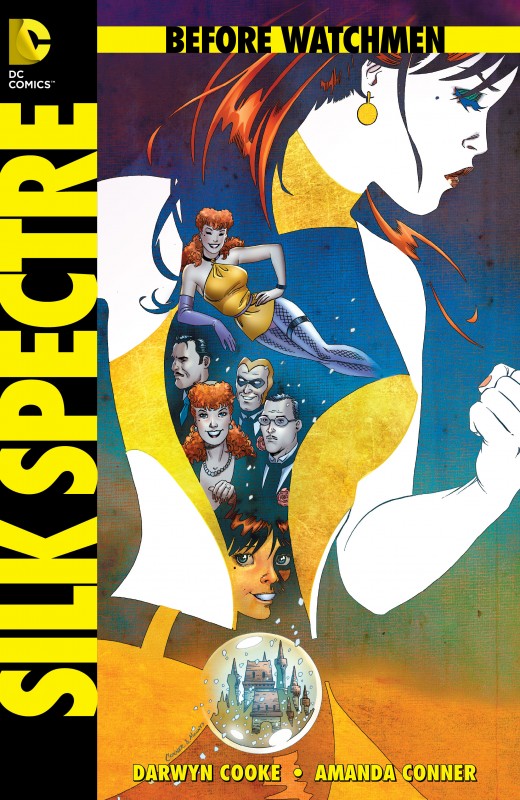
Lucas’s editorial really pisses me off. For better or for worse, he’s in a position to help shape the opinions and minds of new and current comics readers. He’s using his platform to not just support the exploitation of a creator, but to cheer it on. What gets me the most is the sheer… it’s not even entitlement. The sheer scumbaggery on Lucas’s part. The willingness to be a corporate shill. Just the other week, he censored an interview in the name of positivity, but left in a bunch of shots at Rob Liefeld, who is apparently the official punching bag of the comics industry, the guy it’s okay to kick because LOL ROB LIEFELD LOL, no matter how lazy and crap that may be.
(It is interesting, but needlessly conspiracist, to point out that both of these involve Lucas showing favor to DC Comics at the expense of a creator. It’s not a conspiracy, though, because DC has hundreds of fans who will do exactly what Lucas does for the low, low price of free.99. Consult your nearest major comment thread about who owns Superman for further information.)
This sort of go along to get along, Team Comics thing is garbage. It’s another symptom of rot inside comics. Positivity becomes a code word for not rocking the boat and shilling, rather than anything that would actually add to the conversation. Negativity is the worst thing in the world, because we’re all in this together. Lucas’s actions here are the exact type of sucker for love fuckboy horse shit simpery that shows other people that it’s okay to be okay with people being screwed over. Kirby? He had it coming, and John Byrne’s 4th World was better anyway! Ditko? SCHMITko, am I right fellas? The Siegel & Shuster heirs? Aw, they’re just greedy, why don’t they go out and get jobs instead of trying to cancel Superman?
I don’t even understand how Lucas can be in a position to know things about comics, which isn’t hard to begin with, and actually say “Some will point to Alan Moore’s lack of ‘approval’ or involvement as a bad thing, but that’s one of the best parts in my eyes.” and mean it. The comics industry is built on exploitation, your favorite artists from the ’60s and ’70s were almost definitely screwed out of their creations, and editors and managers today apparently believe that having a book on the shelves is a higher calling than having a good book on the shelves. The history of comics isn’t even hard to find out. Alan Moore has been vocal about his experiences, Dwayne McDuffie spoke out, every month there’s a new fund raiser for some old artist who drew some incredibly ill and classic comics but doesn’t have health insurance… this is basic.
I’m not even saying that you can’t like Before Watchmen. Like what you like. You should be cognizant of the situation behind what you like, but you should always just like what you like. Just don’t do what this guy did. Lucas is in a position to shape the hearts and minds of comics readers, and instead, he’s choosing to dickride DC Comics at the expense of the people who actually make comics.
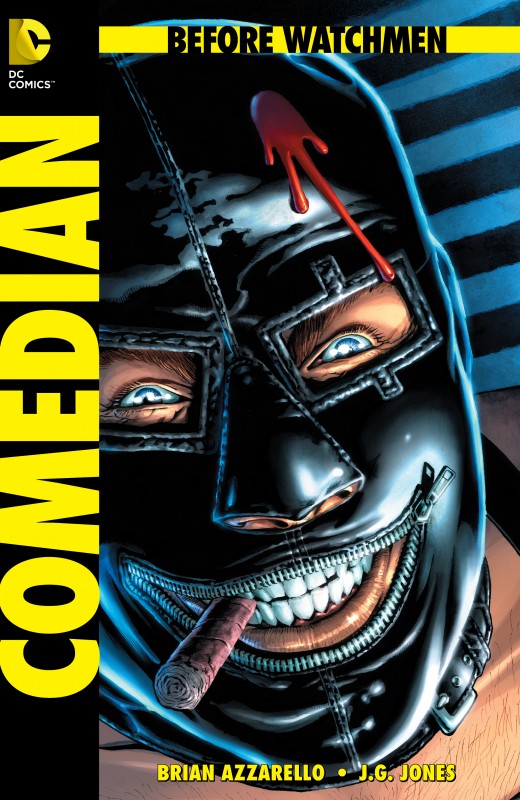
Death to Team Comics, and you need to get the fuck out of here with that garbage. DC won’t ever take you to the prom, Lucas. They don’t even like you. You’re just a customer. That’s all we ever are.




